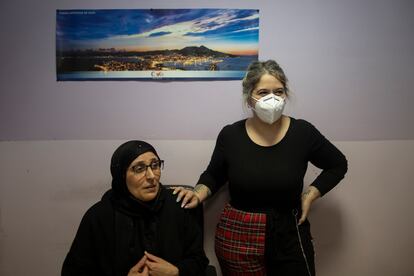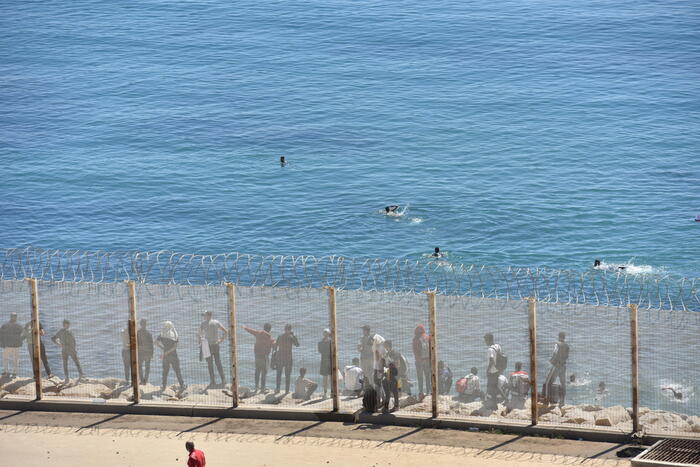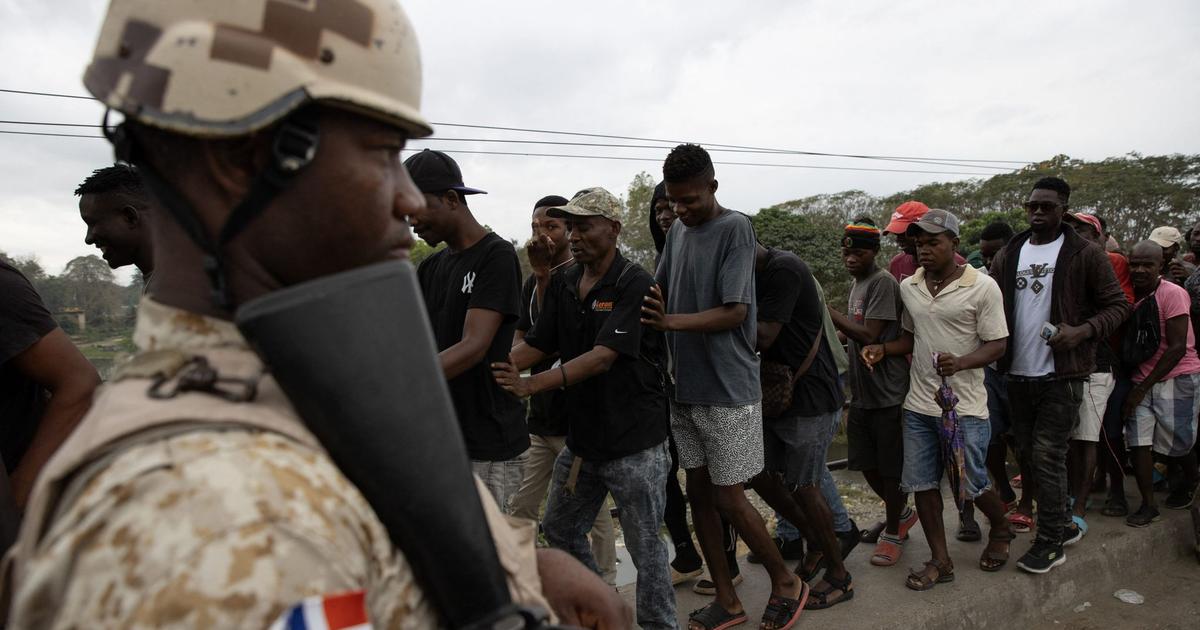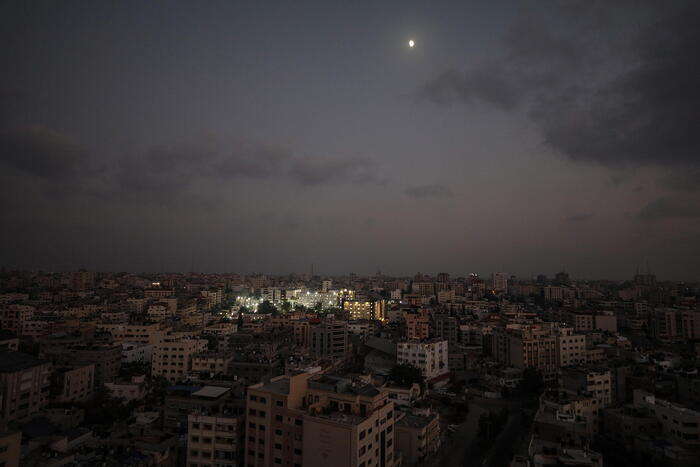Cross-border Moroccan women trapped in Ceuta due to the closure of the border. PACO PUENTES
Apart from the high diplomacy, the inherited fears and the occasional shocks around the fence, the economy of Ceuta —and also of the neighboring Moroccan towns— depends on cross-border transit.
Of goods and also of people.
It will not be front page news —and now less so with the war in Ukraine and the global crisis that has ensued—, but Ceuta has been experiencing a daily and practically invisible drama for two years now.
That of the Moroccan women —and also some men— who crossed customs every day to work in the Spanish city and who returned at nightfall after cleaning houses, working in the hotel industry or caring for the elderly.
Many of these cross-border workers found themselves in the spring of two years ago at a difficult crossroads.
—If I went to Morocco with my family —explains Nadia—, I would lose my job in Ceuta and neither my brothers nor I would have anything to eat.
If I stayed, I'd keep my job as a housekeeper, but who knows when I might see them again.
Nadia perfectly remembers where she was and what she was doing the day she had to make that decision, and also the consequences: “I decided to stay and now I don't know if I did the right thing or the wrong thing, because the border has been closed for two years and I feel like I'm a cage.
There are afternoons that I spend crying and that my situation is not the worst.
A friend of mine has had her father and mother die during this time and she has not been able to go.
imagine.
She left her house one day to come to work and now when she returns the house will be empty, with no one.
And if she were far away, on the other side of the sea or what do I know, still, but knowing that your parents are dying right there, a 20-minute walk away, and not being able to go...”.
"But they didn't even open the border for a case like that?"
-Not even.
There are women who have tried to leave, but the Civil Guard turns them back...
Melodía Gallardo, a young social educator, comforts Nadia's story with her presence and loving gestures.
Melodía has listened to many of their stories in the privacy of a place where the Digmun association teaches these women to get along in Spanish, to speak correctly, to write it, and also to reduce their loneliness by creating links between them: “They are trapped in Ceuta as if they were in a prison.
Their passport has expired and they cannot renew it, which prevents them from doing anything.
They cannot go to Morocco because the border is closed, but they cannot go to the peninsula either, because the cross-border permit that allows them to work here does not authorize them to cross the Strait.
It's just a kind of visa that gives them the right to come to Ceuta in the morning,
but with the obligation to return to Morocco before midnight.
For this reason, most of them are not registered and do not even have a work contract.”
Touria Zarhouni, a cross-border worker, together with Melodía Gallardo, a social educator from the Digmun Association. PACO PUENTES
The 10 or 12 women who are doing writing exercises this afternoon under Melodía's supervision tell details of their forced confinement.
They speak of years working without a contract, of salaries that barely reach 350 euros a month;
poverty wages in any other place, but here and in their circumstances they become the only possibility for their families to get ahead.
Nadia explains it in a very graphic way:
—I have never eaten a single hard from Morocco.
Because my father worked here, and when he died, my mother was left with a small pension.
But then my mother died and I came to work to be able to support my brothers.
"And never under contract?"
-Never.
I have worked in the homes of wealthy people, well-known families in the city, and also in a well-known supermarket.
And every time I asked why they didn't contract me, they told me that first they would have to hire the Spaniards who were on a list.
And then they added: but since you don't have papers we can't hire you.
And, of course, that's why they also pay me less.
But I'm not one of the worst.
I have a job, thank God
Together with Melodía and Nadia, Touria Zarhount says that he takes care of a 90-year-old woman, who never had a problem of coexistence —"neither with Muslims nor with Christians"—, but that the bureaucratic labyrinth turns into hell and the leaves them unprotected: "A lawyer deceived me and took all the money from me."
It is difficult to know how many cross-border workers, between women and men, have been stranded in Ceuta after the closure of the border, which was initially caused by the pandemic, but which later became a measure of pressure from Morocco before the Government. Spanish in protest against the hospitalization in Logroño of the leader of the Polisario Front, Brahim Gali.
The cross-border people who, in the end, became hostages of a diplomatic strategy that has just borne fruit with the reopening of diplomatic relations between Morocco and Spain may number in the hundreds.
Rachida Jraifi dares to make an estimate: “Of those who have a contract, around 200, but without a contract I wouldn't know what to say.
If we add to that those who have stayed in Morocco without having to support their families...”.
Rachida's case is different from that of other women who did consciously decide to stay to keep their jobs.
“I work as a domestic worker”, she explains, “keeping Reme company, a woman who was left alone, because her husband passed away and her daughters are out of it.
In addition to working, I was enrolled in the institute and, as I was leaving late, Reme told me: Rachida, stay here to sleep, because tomorrow you have exams and then you go back to Morocco.
But the next day they closed the border and here I stayed.
Although if I had known, I also would have had to stay.
Who was going to support my family if I didn't?
My father passed away, we are nine siblings and only two of us work abroad: a sister in Algeria and me here...”.
“I work as a domestic worker,” she explains, “keeping Reme company, a woman who was left alone because her husband died and her daughters are away.
In addition to working, I was enrolled in the institute and, as I was leaving late, Reme told me: Rachida, stay here to sleep, because tomorrow you have exams and then you go back to Morocco.
But the next day they closed the border and here I stayed.
Although if I had known, I also would have had to stay.
Who was going to support my family if I didn't?
My father passed away, we are nine siblings and only two of us work abroad: a sister in Algeria and me here...”.
“I work as a domestic worker,” she explains, “keeping Reme company, a woman who was left alone because her husband died and her daughters are away.
In addition to working, I was enrolled in the institute and, as I was leaving late, Reme told me: Rachida, stay here to sleep, because tomorrow you have exams and then you go back to Morocco.
But the next day they closed the border and here I stayed.
Although if I had known, I also would have had to stay.
Who was going to support my family if I didn't?
My father passed away, we are nine siblings and only two of us work abroad: a sister in Algeria and me here...”.
stay here for the night, because tomorrow you have exams and then you go back to Morocco.
But the next day they closed the border and here I stayed.
Although if I had known, I also would have had to stay.
Who was going to support my family if I didn't?
My father passed away, we are nine siblings and only two of us work abroad: a sister in Algeria and me here...”.
stay here for the night, because tomorrow you have exams and then you go back to Morocco.
But the next day they closed the border and here I stayed.
Although if I had known, I also would have had to stay.
Who was going to support my family if I didn't?
My father passed away, we are nine siblings and only two of us work abroad: a sister in Algeria and me here...”.
Rachida Jraifi is a Moroccan worker trapped in Ceuta due to the closure of the border. PACO PUENTES
Rachida and other compatriots have organized to demand an institutional solution, but the result has been null.
“The issue,” he explains, “isn't just that we can't go to Morocco anymore, it's that we're also trapped from a legal point of view.
Most of us have expired passports and we can't do anything about it.
I have not been able to enroll in the institute, nor send money to my family —I have only been able to do it through my employer, who is a sweetheart, like a mother—, nor request the registration, since we have been locked up here these two years.
But they don't even recognize us.
They tell us that they cannot do anything because it is a matter of two sovereign countries, but when they wanted to change the law in the case of minors who were trapped, they did change it.
We are in limbo, trapped,
neither there nor here”.
Rachida says that her friend Fadua arrived pregnant, had her son here and has not yet been able to show him to the father, that other friends who come to the border to yell at their children that they remember them, that they be strong, that soon they will be together.
She also feels a sadness that she has been accumulating in recent months and in which she does not recognize herself: “I miss the Rachida that I was before, I miss myself.
I was always cheerful, but now I'm off.
Also of a sadness that has been accumulating in recent months and in which she does not recognize herself: “I really miss the Rachida that I was before, I miss myself.
I was always cheerful, but now I'm off.
Also of a sadness that has been accumulating in recent months and in which she does not recognize herself: “I really miss the Rachida that I was before, I miss myself.
I was always cheerful, but now I'm off.
Exclusive content for subscribers
read without limits
subscribe
I'm already a subscriber









